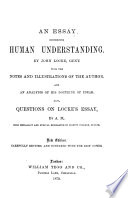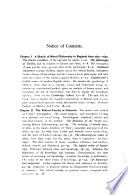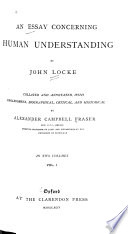 I think evident, that we find in ourselves a power to begin or forbear, continue or end several actions of our minds, and motions of our bodies, barely by a thought or preference of the mind ordering, or, as it were, commanding the doing or not doing... I think evident, that we find in ourselves a power to begin or forbear, continue or end several actions of our minds, and motions of our bodies, barely by a thought or preference of the mind ordering, or, as it were, commanding the doing or not doing...  The Works of John Locke - Page 235by John Locke - 1823Full view The Works of John Locke - Page 235by John Locke - 1823Full view - About this book
 | Thomas Reid - 1863 - 552 pages
...adds, " That we find in ourselves a power to begin or forbear, continue or end, several actions of our minds and motions of our bodies, barely by a thought...as it were, commanding the doing or not doing such a particular action. This power which the mind has thus to order the consideration of any idea, or... | |
 | John Locke - 1879 - 722 pages
...in ourselves a power to begin or forbear, continue or end, several actions of our minds and motion* of our bodies, barely by a thought or preference of...particular action^: This power which the mind has thus to brder the consideration of any idea, or the forbearing to consider it, or to prefer the motion of any... | |
 | George Frederick Shrady, Thomas Lathrop Stedman - 1881 - 798 pages
...philosopher Locke well described as a " power to begin or forbear, continue or end the several actions of our minds and motions of our bodies, barely by a thought or preference of the mind." This power is called the Will It is not thought by modern psychologists, or evea by all of the older... | |
 | Noah Porter - 1890 - 642 pages
...cognitive operations, and to the second all the powers, active impulses, both emotional and voluntary. " This power which the mind has, thus to order the consideration...forbearing to consider it, or to prefer the motion tinion ot any Part of the kody t° its restr and vice Kcrsui in allv Particular instance, is that which... | |
 | Mattoon Monroe Curtis - 1890 - 168 pages
..."We find in ourselves", says Locke, "a power to begin or forbear, continue or end, several actions of our minds, and motions of our bodies, barely by a thought or \ preference of the mind ordering. This power of ordering which the mind has, is called the Will." (II. 21; 5.) Although Locke admits... | |
 | James Fitzjames Stephen - 1892 - 440 pages
...will and understanding. Will is the power 'to begin or forbear, continue or end, several actions of our minds and motions of our bodies barely by a thought or preference of the mind.' Volition is the exercise of that power with regard to any particular act. Understanding is the power... | |
 | John Locke - 1894 - 692 pages
...barely by [4 a thought] 'wo or preference of the mind [5 ordering, or as it were commanding. Mimfor '" the doing or not doing such or such a particular action.] This Spirit. power^which the mind Jias [e thus to order] the consideration of anyjdea, or the forbearing... | |
 | Literary and Philosophical Society of Liverpool - 1897 - 360 pages
...Locke, " that we find in ourselves a power to begin or forbear, continue or end, several actions of our minds and motions of our bodies, barely by a thought or preference of the mind ordering."* So far I have been describing certain facts of my inner experience ; I have now to mention one great... | |
 | Literary and Philosophical Society of Liverpool - 1897 - 346 pages
...Locke, " that we find in ourselves a power to begin or forbear, continue or end, several actions of our minds and motions of our bodies, barely by a thought or preference of the mind ordering."* So far I have been describing certain facts of my inner experience; I have now to mention one great... | |
 | Archibald Alexander - 1898 - 376 pages
...shown that we find within ourselves a power to begin or forbear, continue or end, several actions of our minds, and motions of our bodies, barely by a...doing such or such a particular action. This power is the will. Its particular exercise in any direction is volition or willing.2 The forbearance of that... | |
| |